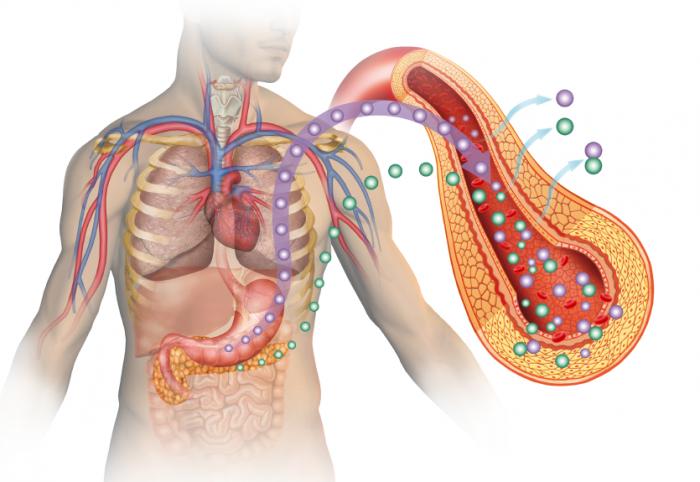When we think of the words “crazy hormones,” we often think of pubescent tweens and pregnant women. While this mental picture holds some truth to it, it’s lacks the sad reality we’re facing today.
What should really come into our minds when we think of hormones is Homer Simpson. He’s a fat, donut-eating middle-aged man who can’t seem to put down his beer. With the high prevalence of Type 2 diabetes and obesity in our world these days, a pudgy man holding a pastry is as accurate of a picture of hormones gone awry as one can get.
Hormones Drive Our Physiology
As we discussed in our previous post, obesity is not a calorie problem, it’s a hormone problem. To understand this abstract concept a little better, let’s get into some science.
Insulin is a hormone released by the pancreas. The role of insulin is to take the sugar (glucose) from carbohydrates and protein and store it as fuel. When we eat, our body sends a signal to the cells in our pancreas to spark an insulin release. The insulin is then distributed into the bloodstream and it allows for the absorption of glucose. Without insulin, our body would go into extreme states of hyperglycemia (high blood sugar), which would result in death. Insulin is also the key to allowing our cells to access blood sugar. Without insulin, our cells would starve and we would die. This is why diabetic patients must inject themselves with insulin to keep their bodies functioning and alive. Insulin’s role in our body is critical. The glucose absorption and energy storage resulting from insulin secretion allows us to have the energy we need for living.

Our bodies often end up with more sugar in our bloodstream than we need in one sitting. When we eat a high carbohydrate meal, such as pasta, bread, soda, and rice, a glucose overload results. Thankfully, insulin takes that excess sugar in the bloodstream and stores in the liver for a rainy day. When we’re in the middle of heavy exercise or haven’t eaten all day due to a busy schedule, our body is able to tap into the stored glucose in the liver. Dr. Fung, a highly-respected authority in fasting, often likens glucose storage in the liver to a refrigerator storing food that we can easily grab on a whim. When we’re feeling hungry and we’re in the comfort of our homes, we tap into the fridge and grab what we need to satisfy our hunger. Similarly, when hunger strikes, the body reaches for our glucose reserves in the liver.
Cortisol, like insulin, is another hormone playing a huge role in our physiology. Cortisol is a steroid hormone—a glucocorticoid—produced in the adrenal glands. Nearly all human cells have receptors for cortisol, making it a very complex hormone with various applications. While cortisol is commonly dubbed the “stress hormone,” its job is far reaching. Cortisol is secreted into the bloodstream to help regulate inflammation, blood sugar, balance sodium, produce memories, help women during childbirth, and, yes, bring alertness and responsiveness during times of stress. Cortisol secretion should typically follow a healthy pattern, or diurnal rhythm. Cortisol levels should be highest in the morning, steady throughout the day, and slowly decreasing by sun fall. The hypothalamus, pituitary gland, and adrenal glands all communicate and work together to properly secrete cortisol throughout the day. This is often referred to as the HPA-axis. Too much cortisol can result in Cushing’s disease, and too little can result in Addison’s disease.
Cortisol has made a huge name for itself in the past few years, rising to be well known by most people because of this hormone’s relationship to stress. When our bodies sense that we’re stressed, cortisol is released as part of the get-up-and-go reaction or fight-or-flight mechanism. When the body is called into action, glucose is released from the liver for fuel and insulin is immediately secreted from the pancreas. The body works together beautifully.
Why Do Insulin and Cortisol Affect My Weight?
In ancestral times, our bodies worked the way they were designed to and obesity was rare. Insulin and Cortisol worked as they should, and the body didn’t have any major roadblocks toward functioning optimally. Our ancestors were far more active people, and their bodies used up the stored glucose in their livers effectively and regularly, and cortisol was released in response to stressful times of running from predators or traveling long distances from one campsite to the next. The body balanced itself naturally, and diurnal rhythms were kept in check because activity would start when the sun would rise, and stop when the sun would set. It was simple.

Modernization and industrialization have made us sick and fat, and here’s why. We eat way too much, consume the wrong types of foods, don’t move our bodies the way we need to, go to bed too late because we get caught up staring at a screen of some kind, wake up too early, and stress all day long about anything and everything. We’ve lost touch with the simplicity and natural flow of life, and we’re paying an incredibly high price as a result.
While there’s an endless stream of discussion to be had around all the disruption taking place societally as a result of toxins, technological idolization, and a stress-as-fuel mentality, let’s stay on track and get back to the hormone discussion.
When it comes to insulin resistance, there are a couple of working theories in the medical community. The first is that the cells essentially get tired of responding to the call to absorb glucose, and they stop listening. Insulin tries to get the glucose into the cell, but the cell has turned the lights off and closed the blinds. The pancreas doesn’t get the memo that the cells are “over it,” so it continues pumping insulin to lower the high blood sugar coursing through the veins. The second, and most currently studied, is the idea that the cells are so packed full of sugar from chronically high insulin levels, that there is literally no more room for glucose, which causes blood sugar and insulin to be continuously elevated. Surprisingly, before we see elevated blood sugar markers, the chaos is already taking place and manifesting in the form of weight gain, sluggishness, brain fog, and increases in cholesterol and blood pressure. Insulin resistance is a huge problem and one that we’re constantly learning more about, and one of the first signs is the inability to lose weight. Any way we look at it, insulin starts telling the body to store sugar as fat because it cannot go into the cells as it should.
Cortisol resistance works similarly. When we’re running on overdrive and constantly stressed, the body thinks it’s in danger, so it releases cortisol into the bloodstream to help kick the system into fighting action. Since stored glucose is released in this process as well, what ends up happening is that the body is flooded with hormones that have no outlet. The cells are not receptive to insulin anymore, and the cortisol in the blood stream has no physical outlet. The body has to compensate somehow, so the hormones get stored as fat. When we’re living on stress fumes all day, the body acts as if we’re eating sugar all day long. It’s a vicious cycle, and one that’s been brought on by extremely high carbohydrate diets and high stress lifestyles.
Put Down the Pizza and Go to Bed
In order to help our bodies work optimally despite our modern lifestyles, we want to start loading up on more healthy fats and reducing the amount of carbohydrates we consume. This will help our body have less glucose to burn through in the liver and, eventually, the body will start using fat stores as fuel. When we eat a high fat—ketogenic—diet, our bodies start to prefer fat to glucose, allowing for all the stored fat in our body to be used as fuel. At lunch, swap the bread on your sandwich for a lettuce wrap and fill it with an avocado. For dinner, put down the bread, cut out the rice, and load up on egg yolks, coconut oil, and fresh olives. No raise of hands here, but if you’re still drinking soda and sweetened frappucinos, I’m pretty sure you know what you need to do.
Additionally, we need to increase our mindfulness amidst our business. Prayer, meditation, yoga, gentle exercise, and proper sleep are all critical in regulating hormones and being able to lose weight. For more information on how to begin a mindfulness practice, check out Jon Kabat-Zinn’s website for some great resources.
I’d love to hear from you! Are your hormones dysregulated and in need of some extra care? Have you been a carbohydrate lover and is it starting to show in your lab results or midsection? Let me know your thoughts in the comments below.





